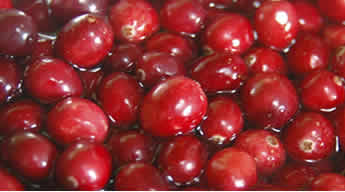Antioxidant benefits from Cranberry
The antioxidant action of cranberry is the primary health benefit that this herb is known for. Cranberry is rich in natural antioxidant nutrients such as manganese and vitamin C but what makes cranberry a unique and potent antioxidant is that it contains an array of phytonutrients. The phytonutrients found in cranberry act together in synergy in working against free radicals in the body. Antioxidant chemicals such as phenolic acid, proanthocyanidin, anthocyain, flavanoids and triterpenoid have been found in laboratory studies as effective in removing free radical intermediates at the same time inhibit other cell oxidation
Anti-Cancer Benefits of Cranberry
Another compelling health benefit derived from consuming cranberry is that it has anti-cancer activity. While consuming cranberry may not be a cure for cancer but studies suggest that dietary intake of cranberry can help prevent cancer or supplement other cancer therapies and treatment.
Laboratory studies investigated the role of the phenolic antioxidants ellagic acid and resveratrol, present in grapes and berries (such as cranberries) at high levels, in the inhibition of human cancer cells. The study has shown that both compounds inhibited the growth of certain cancer cells, specifically colon and prostate cancer cells. The anti-cancer property of the compounds act by interfering with the expression of a number of genes required for cell growth and activating apoptoticspecific proteins that can trigger cell death (Narayanan, B.A., Narayanan, N.K., Stoner, G.D., Bullock, B.P. Interactive gene expression pattern in prostate cancer cells exposed to phenolic antioxidants. Life Sciences. 2002;70:1821-1839)
Cranberry has anti-inflammatory benefit
Cranberry also has an anti-inflammatory health benefit. The phytonutrients in cranberry has been found to effectively reduce unwanted inflammation.
In a study conducted about periodontitis, a chronic inflammatory disease affecting oral tissues. Cranberry fraction was found to be a potent inhibitor of the pro-inflammatory cytokine and chemokine responses induced by lipopolysaccharides . This result suggests that cranberry constituents have value for the development of a new therapeutic approach for the prevention and treatment of periodontitis.
Cranberry protects against Urinary Tract Infection (UTI)
Cranberry has long been used as folkloric treatment against urinary problems including urinary tract infection or UTI. This medicinal benefit of cranberry has been studied in laboratory and results show that cranberry has been effective in vitro and in vivo in animals for the prevention of urinary tract infection (UTI). Cranberry appears to work by inhibiting the adhesion of type I and P-fimbriated uropathogens (e.g. uropathogenic E. coli) to the uroepithelium, thus impairing colonization and subsequent infection.
Cranberry has Anti-microbial property.
Recent studies have shown that cranberries may have an anti-adhesion effect on certain harmful bacteria in the mouth and stomach that cause gum disease and stomach ulcers. This anti-microbial effect of the cranberry may be attributed to the unique structure of compounds found in it which are called proanthocyanidins, or PACs. These constituents in cranberry are responsible for this anti-adhesion benefit. Other laboratory research also suggests that cranberries may also have beneficial effect against gastrointestinal viruses by preventing the virus from attaching to red blood cells or infecting host cells
Cranberry has Cardiovascular Benefits
The synergestic effect of cranberry in providing antioxidant health benefit as we al anti-inflammatory benefit from its phytonutrients has been considered to offer cardiovascular benefits as well. In a sample conducted in people. Subjects where cranberry has been included in their diets have indicated a reduced risk of developing atherosclerosis (the thickening of the blood vessels). It has been found out that cranberry may be responsible in inhibiting the activation of two enzymes, inducible nitric oxide synthase and cyclo-oxygenase 2, that are pivotal in the development of arthrosclerosis. Cranberry prevents the activation of these enzymes by blocking the inflammatory cytokine-messaging which makes it beneficial in cardiovascular protection.
The antioxidant activity of cranberry, likewise play a key role in cranberry's acclaimed cardiovascular benefits. In laboratory studies in animals, intake of cranberry extract has reduced the development of high blood pressure in mice making it beneficial against cardiovascular problems. The cranberry extract acts by reducing the oxidative stress inside the blood vessels thus preventing the over constriction of the blood vessels and the unwanted increase in blood pressure.
Moreover, cranberry has been found to lower the LDL-cholesterol level in the blood while at the same time increasing the good HDL-cholesterol level. The oxidative and anti-inflammatory constituents found in cranberry have been found to provide these health benefits.

 Cranberries (singular: cranberry; Vaccinium macrocarpon)) are creeping shrubs or vines that grows to about 2 meters in length and up to 20 centimeters high. Cranberry is native to Northern America and Southern Asia growing wild in sandy bogs. Cranberry is used as food and medicine by Native Americans for centuries. Cranberry stems are slender with small evergreen leaves that are speckled with tiny dots underneath. Cranberry blooms pink flowers with very distinct reflexed petals, leaving the style and stamens fully exposed and pointing forward. Cranberry is related to blueberry, huckleberry and bilberry. Cranberry has an edible fruit that is initially white but turns to black red color when ripe.
Cranberries (singular: cranberry; Vaccinium macrocarpon)) are creeping shrubs or vines that grows to about 2 meters in length and up to 20 centimeters high. Cranberry is native to Northern America and Southern Asia growing wild in sandy bogs. Cranberry is used as food and medicine by Native Americans for centuries. Cranberry stems are slender with small evergreen leaves that are speckled with tiny dots underneath. Cranberry blooms pink flowers with very distinct reflexed petals, leaving the style and stamens fully exposed and pointing forward. Cranberry is related to blueberry, huckleberry and bilberry. Cranberry has an edible fruit that is initially white but turns to black red color when ripe.

